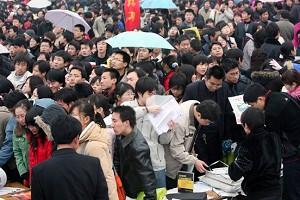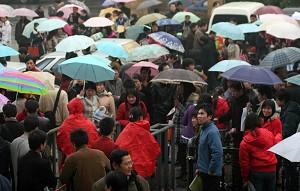Shortly after the Chinese New Year (the most important holiday in China), Chinese university graduates turned their attention back to finding a job.
Nearly five million students will graduate from Chinese universities this year—820,000 more than the year before—and they face a tough road ahead to find employment.
The lack of employment opportunities available to these recent grads is best reflected in the job fairs that are held all across the country.
Many of these fairs—held during the end of February and early March—are usually packed with students pouring in to look for jobs. There is always a big turn out of applicants, even if there is heavy rain, and the eager applicants always far outweigh the available openings.

Rain didn't stop 60,000 employee hopefuls from attending the spring job fair in Shijiazhuang City, Hebei Province on March 1, 2007. The Epoch Times





